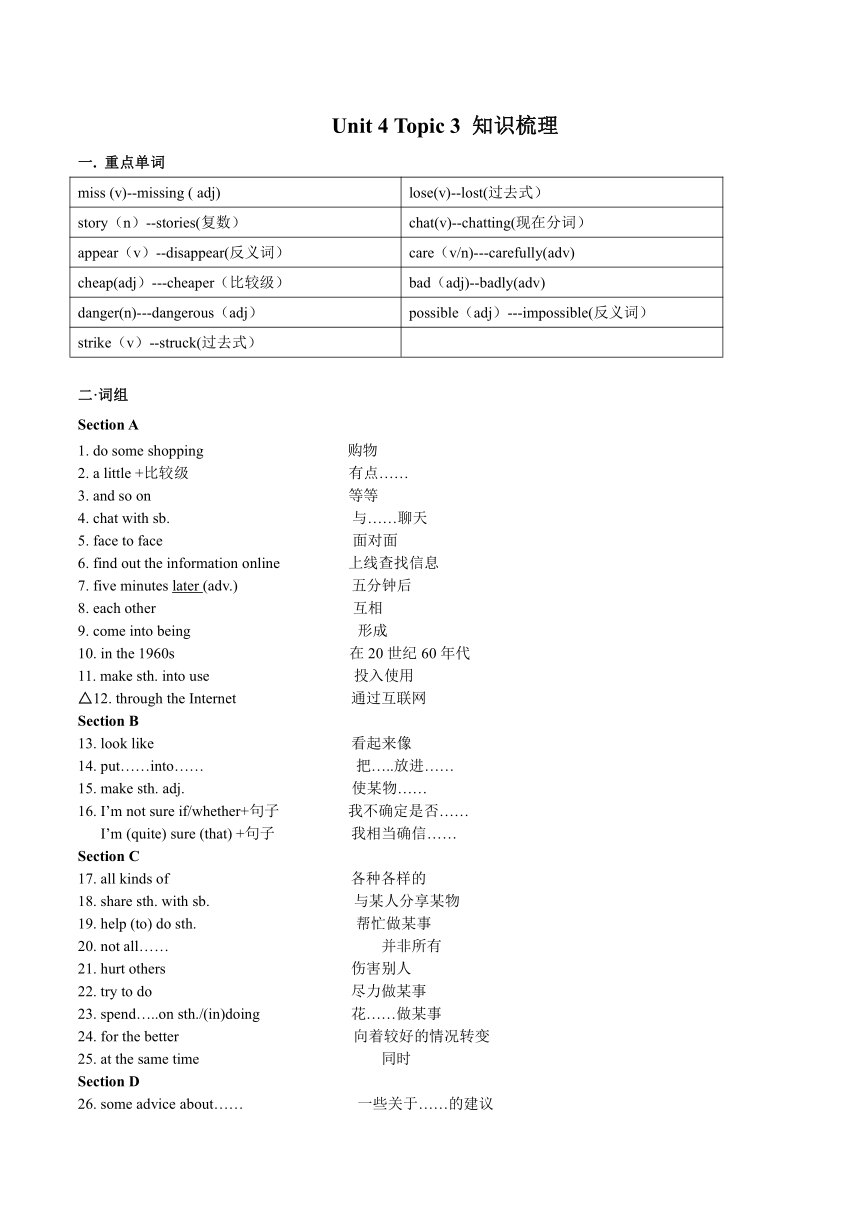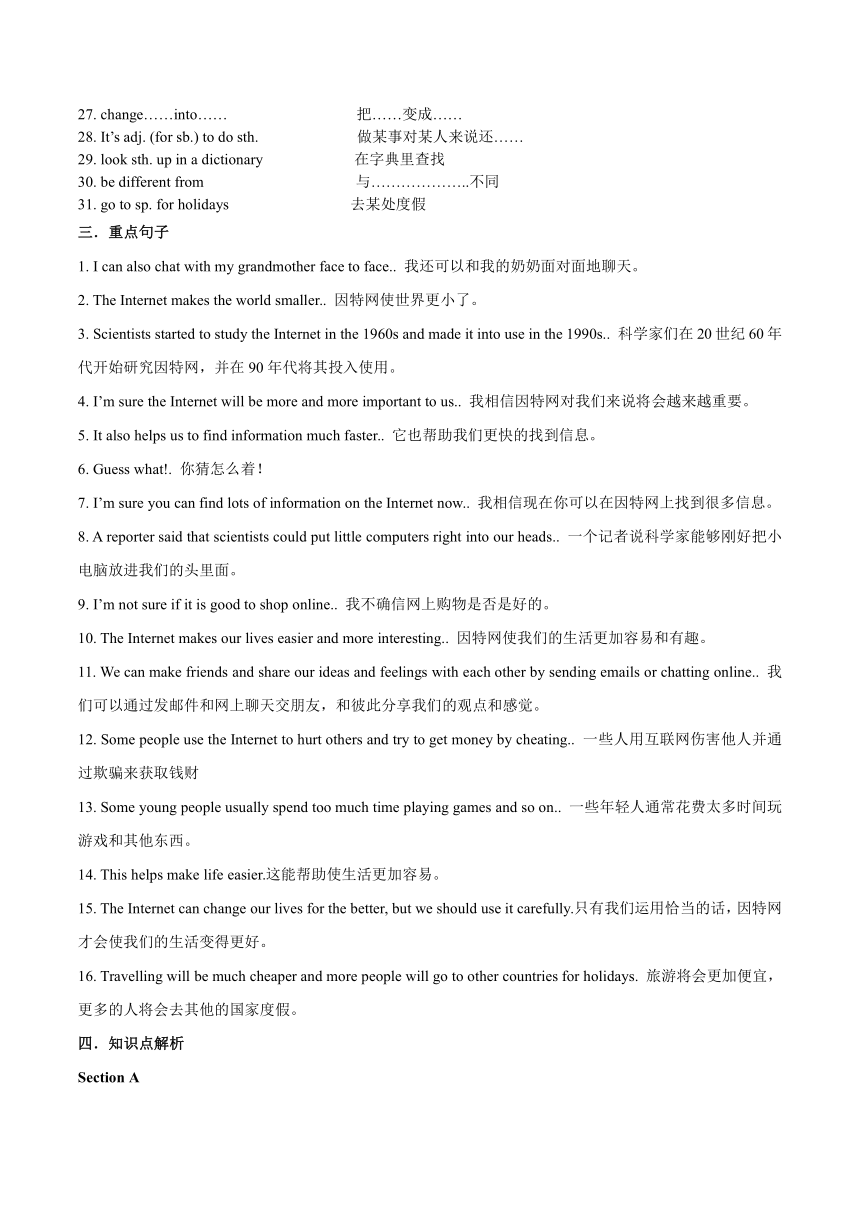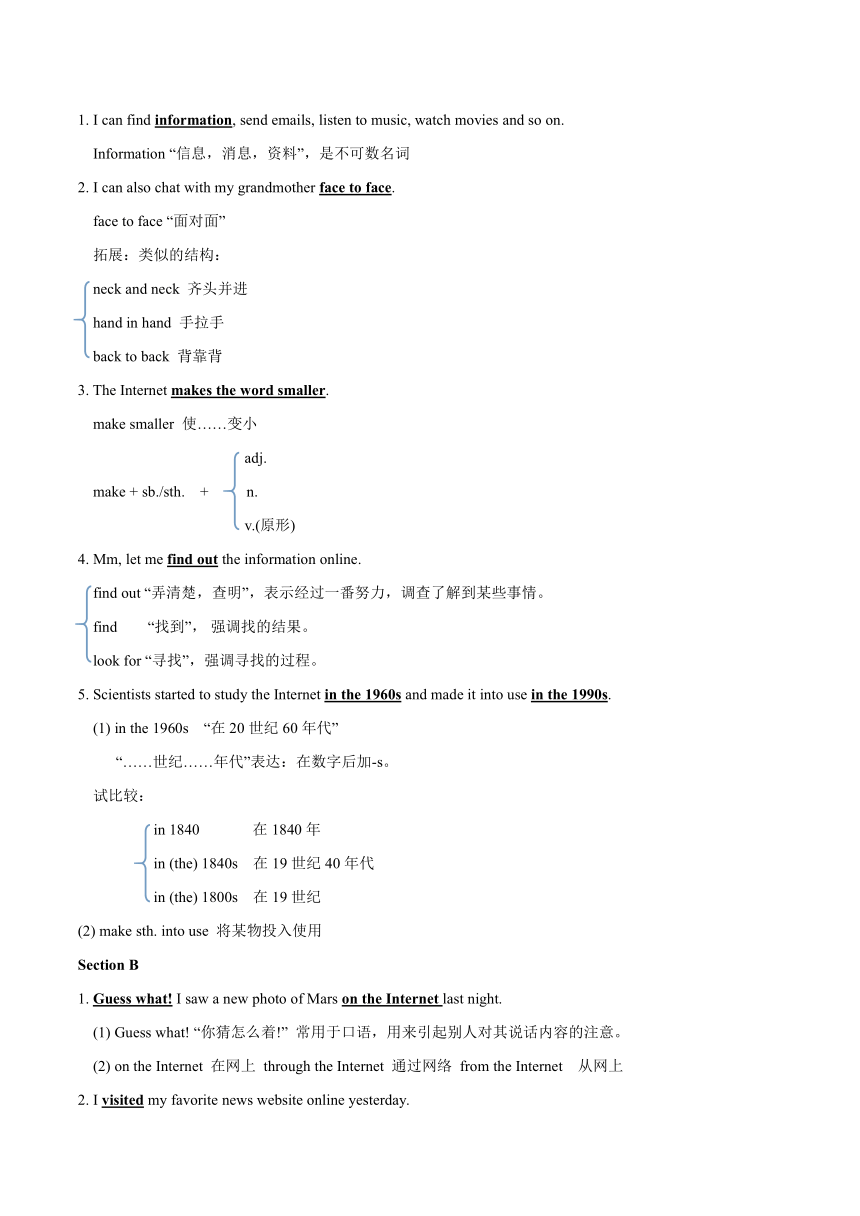仁爱版英语八年级上册 Unit 4 Topic 3 The Internet makes the world smaller 知识梳理
文档属性
| 名称 | 仁爱版英语八年级上册 Unit 4 Topic 3 The Internet makes the world smaller 知识梳理 |

|
|
| 格式 | docx | ||
| 文件大小 | 33.0KB | ||
| 资源类型 | 教案 | ||
| 版本资源 | 仁爱科普版 | ||
| 科目 | 英语 | ||
| 更新时间 | 2022-08-24 13:51:00 | ||
图片预览



文档简介
Unit 4 Topic 3 知识梳理
重点单词
miss (v)--missing ( adj) lose(v)--lost(过去式)
story(n)--stories(复数) chat(v)--chatting(现在分词)
appear(v)--disappear(反义词) care(v/n)---carefully(adv)
cheap(adj)---cheaper(比较级) bad(adj)--badly(adv)
danger(n)---dangerous(adj) possible(adj)---impossible(反义词)
strike(v)--struck(过去式)
二·词组
Section A
1. do some shopping 购物
2. a little +比较级 有点……
3. and so on 等等
4. chat with sb. 与……聊天
5. face to face 面对面
6. find out the information online 上线查找信息
7. five minutes later (adv.) 五分钟后
8. each other 互相
9. come into being 形成
10. in the 1960s 在20世纪60年代
11. make sth. into use 投入使用
△12. through the Internet 通过互联网
Section B
13. look like 看起来像
14. put……into…… 把…..放进……
15. make sth. adj. 使某物……
16. I’m not sure if/whether+句子 我不确定是否……
I’m (quite) sure (that) +句子 我相当确信……
Section C
17. all kinds of 各种各样的
18. share sth. with sb. 与某人分享某物
19. help (to) do sth. 帮忙做某事
20. not all…… 并非所有
21. hurt others 伤害别人
22. try to do 尽力做某事
23. spend…..on sth./(in)doing 花……做某事
24. for the better 向着较好的情况转变
25. at the same time 同时
Section D
26. some advice about…… 一些关于……的建议
27. change……into…… 把……变成……
28. It’s adj. (for sb.) to do sth. 做某事对某人来说还……
29. look sth. up in a dictionary 在字典里查找
30. be different from 与………………..不同
31. go to sp. for holidays 去某处度假
三.重点句子
1. I can also chat with my grandmother face to face.. 我还可以和我的奶奶面对面地聊天。
2. The Internet makes the world smaller.. 因特网使世界更小了。
3. Scientists started to study the Internet in the 1960s and made it into use in the 1990s.. 科学家们在20世纪60年代开始研究因特网,并在90年代将其投入使用。
4. I’m sure the Internet will be more and more important to us.. 我相信因特网对我们来说将会越来越重要。
5. It also helps us to find information much faster.. 它也帮助我们更快的找到信息。
6. Guess what!. 你猜怎么着!
7. I’m sure you can find lots of information on the Internet now.. 我相信现在你可以在因特网上找到很多信息。
8. A reporter said that scientists could put little computers right into our heads.. 一个记者说科学家能够刚好把小电脑放进我们的头里面。
9. I’m not sure if it is good to shop online.. 我不确信网上购物是否是好的。
10. The Internet makes our lives easier and more interesting.. 因特网使我们的生活更加容易和有趣。
11. We can make friends and share our ideas and feelings with each other by sending emails or chatting online.. 我们可以通过发邮件和网上聊天交朋友,和彼此分享我们的观点和感觉。
12. Some people use the Internet to hurt others and try to get money by cheating.. 一些人用互联网伤害他人并通过欺骗来获取钱财
13. Some young people usually spend too much time playing games and so on.. 一些年轻人通常花费太多时间玩游戏和其他东西。
14. This helps make life easier.这能帮助使生活更加容易。
15. The Internet can change our lives for the better, but we should use it carefully.只有我们运用恰当的话,因特网才会使我们的生活变得更好。
16. Travelling will be much cheaper and more people will go to other countries for holidays. 旅游将会更加便宜,更多的人将会去其他的国家度假。
四.知识点解析
Section A
1. I can find information, send emails, listen to music, watch movies and so on.
Information “信息,消息,资料”,是不可数名词
2. I can also chat with my grandmother face to face.
face to face “面对面”
拓展:类似的结构:
neck and neck 齐头并进
hand in hand 手拉手
back to back 背靠背
3. The Internet makes the word smaller.
make smaller 使……变小
adj.
make + sb./sth. + n.
v.(原形)
4. Mm, let me find out the information online.
find out “弄清楚,查明”,表示经过一番努力,调查了解到某些事情。
find “找到”, 强调找的结果。
look for “寻找”,强调寻找的过程。
5. Scientists started to study the Internet in the 1960s and made it into use in the 1990s.
(1) in the 1960s “在20世纪60年代”
“……世纪……年代”表达:在数字后加-s。
试比较:
in 1840 在1840年
in (the) 1840s 在19世纪40年代
in (the) 1800s 在19世纪
(2) make sth. into use 将某物投入使用
Section B
1. Guess what! I saw a new photo of Mars on the Internet last night.
(1) Guess what! “你猜怎么着!” 常用于口语,用来引起别人对其说话内容的注意。
(2) on the Internet 在网上 through the Internet 通过网络 from the Internet 从网上
2. I visited my favorite news website online yesterday.
(1) visit 访问,拜访
(2) at news website 在新闻网站上
3. A reporter said that scientists could put little computers right into our heads.
(1) little 小的
几乎没有,修饰不可数名词,表否定;a little 表肯定,一些
few 几个,修饰可数名词,表否定;a few 表肯定, 几个
(2) right 副词,直接地;修饰动词put
4. I’m sure you can find lots of information on the Internet now.
be sure + (that) + 句子 确信...
be not sure + whether/if + 句子 不确信是否...
Section C
1. Some people use the Internet to hurt others and try to get money by cheating.
(1) use sth. to do sth. 用某物去做某事。
(2) by 介词。意为“用……(方式,手段)”。后加doing形式
2. The Internet can change our lives for the better, but we should use it carefully.
(1) for the better 意为“向着较好的情况(转变)”
(2) carefully 副词。小心地,认真地。
careful 形容词。小心的 care
care 动词 关系
3. However, the Internet is not perfect.
but常位于句中;however则可位于任何部分,常用逗号隔开。都表示但是的意思。
Section D
1. If you want to change English words into Chinese or Chinese words into English,
then there are websites that can do this for you.
change ... into ... 意为“把……变成……,把……译成……”
2. Finally, it is possible to look up new words in an online dictionary.
look up 意为“在(字典、教科书等)中查找”
当look up的宾语是名词时,名词可放在look up的中间或后面;宾语是代词时,
只能放在look up的中间与look 相关的短语有:look after; look for;look out; look the same; look at
3. Life in the future will be different from life today.
be different from意为“……与……不一样”
五.语法
主语+谓语+宾语+宾语补足语
宾语补足语指在英语中有些及物动词接了宾语意义仍不完整,还需要有一个其他的句子成分来补充说明宾语的意义、状态等。
1. 名词短语作宾语补足语。如:
He called it Mickey Mouse. 他把它叫做米老鼠。
We are making our school a beautiful garden. 我们正努力使校园变成一个美丽的花园。
2. 形容词短语作宾语补足语。如:
The Internet makes the world smaller. 互联网使世界变得小了。
The news made her sad. 这消息使她感到悲伤。
3. 副词短语作宾语补足语。如:
Put them away, please. 请把它们收起来。
Don’t leave with lights on. 离开时请关灯。
4. 介词短语作宾语补足语。如:
She found the dog under the table. 她发现狗在桌子下面。
5. 不定式短语作宾语补足语。如:
She wants you to call her back soon. 她想让你马上回电话。
I tell you not to do so. 我告诉你别这么做。
注:有些动词如feel, see, hear, watch, make, let, have 等用不带to的不定式或不定式短语作宾语补足语。如:A special language makes computers talk with each other. 一种专门的语言使电脑之间能互相通话。
6. 分词短语作宾语补足语。如: I heard someone crying. 我听到有人哭了。
I found all the windows broken. 我发现所有的窗户都破了。
六.书面表达
现在学生在网吧上网(get online)成风,你们班在下周班会上将谈论有关问题。请你根据表格中提示的内容用英语写一篇60词左右的讲话稿,要点必须齐全。
益处 学会使用现代设备——电脑; 学会更多知识(knowledge); 玩游戏,使人更加聪明。
坏处 过于沉迷游戏,对学习有害; 网上交友,通信频繁,学习成绩下降。
建议 在学校学习时不上网; 寒暑假可以上网。
【参考范文】
Many students like getting online very much. They can learn how to use the modern machine — computers. They can learn much more knowledge from the Internet. It can make them clever by playing different kinds of games.
But some students spend too much time playing games. Some even make friends online. It takes them too much time to write too many letters to each other, so they do worse in their lessons.
I think they mustn’t get online when they’re studying at school. They can do it in summer or winter holidays.
重点单词
miss (v)--missing ( adj) lose(v)--lost(过去式)
story(n)--stories(复数) chat(v)--chatting(现在分词)
appear(v)--disappear(反义词) care(v/n)---carefully(adv)
cheap(adj)---cheaper(比较级) bad(adj)--badly(adv)
danger(n)---dangerous(adj) possible(adj)---impossible(反义词)
strike(v)--struck(过去式)
二·词组
Section A
1. do some shopping 购物
2. a little +比较级 有点……
3. and so on 等等
4. chat with sb. 与……聊天
5. face to face 面对面
6. find out the information online 上线查找信息
7. five minutes later (adv.) 五分钟后
8. each other 互相
9. come into being 形成
10. in the 1960s 在20世纪60年代
11. make sth. into use 投入使用
△12. through the Internet 通过互联网
Section B
13. look like 看起来像
14. put……into…… 把…..放进……
15. make sth. adj. 使某物……
16. I’m not sure if/whether+句子 我不确定是否……
I’m (quite) sure (that) +句子 我相当确信……
Section C
17. all kinds of 各种各样的
18. share sth. with sb. 与某人分享某物
19. help (to) do sth. 帮忙做某事
20. not all…… 并非所有
21. hurt others 伤害别人
22. try to do 尽力做某事
23. spend…..on sth./(in)doing 花……做某事
24. for the better 向着较好的情况转变
25. at the same time 同时
Section D
26. some advice about…… 一些关于……的建议
27. change……into…… 把……变成……
28. It’s adj. (for sb.) to do sth. 做某事对某人来说还……
29. look sth. up in a dictionary 在字典里查找
30. be different from 与………………..不同
31. go to sp. for holidays 去某处度假
三.重点句子
1. I can also chat with my grandmother face to face.. 我还可以和我的奶奶面对面地聊天。
2. The Internet makes the world smaller.. 因特网使世界更小了。
3. Scientists started to study the Internet in the 1960s and made it into use in the 1990s.. 科学家们在20世纪60年代开始研究因特网,并在90年代将其投入使用。
4. I’m sure the Internet will be more and more important to us.. 我相信因特网对我们来说将会越来越重要。
5. It also helps us to find information much faster.. 它也帮助我们更快的找到信息。
6. Guess what!. 你猜怎么着!
7. I’m sure you can find lots of information on the Internet now.. 我相信现在你可以在因特网上找到很多信息。
8. A reporter said that scientists could put little computers right into our heads.. 一个记者说科学家能够刚好把小电脑放进我们的头里面。
9. I’m not sure if it is good to shop online.. 我不确信网上购物是否是好的。
10. The Internet makes our lives easier and more interesting.. 因特网使我们的生活更加容易和有趣。
11. We can make friends and share our ideas and feelings with each other by sending emails or chatting online.. 我们可以通过发邮件和网上聊天交朋友,和彼此分享我们的观点和感觉。
12. Some people use the Internet to hurt others and try to get money by cheating.. 一些人用互联网伤害他人并通过欺骗来获取钱财
13. Some young people usually spend too much time playing games and so on.. 一些年轻人通常花费太多时间玩游戏和其他东西。
14. This helps make life easier.这能帮助使生活更加容易。
15. The Internet can change our lives for the better, but we should use it carefully.只有我们运用恰当的话,因特网才会使我们的生活变得更好。
16. Travelling will be much cheaper and more people will go to other countries for holidays. 旅游将会更加便宜,更多的人将会去其他的国家度假。
四.知识点解析
Section A
1. I can find information, send emails, listen to music, watch movies and so on.
Information “信息,消息,资料”,是不可数名词
2. I can also chat with my grandmother face to face.
face to face “面对面”
拓展:类似的结构:
neck and neck 齐头并进
hand in hand 手拉手
back to back 背靠背
3. The Internet makes the word smaller.
make smaller 使……变小
adj.
make + sb./sth. + n.
v.(原形)
4. Mm, let me find out the information online.
find out “弄清楚,查明”,表示经过一番努力,调查了解到某些事情。
find “找到”, 强调找的结果。
look for “寻找”,强调寻找的过程。
5. Scientists started to study the Internet in the 1960s and made it into use in the 1990s.
(1) in the 1960s “在20世纪60年代”
“……世纪……年代”表达:在数字后加-s。
试比较:
in 1840 在1840年
in (the) 1840s 在19世纪40年代
in (the) 1800s 在19世纪
(2) make sth. into use 将某物投入使用
Section B
1. Guess what! I saw a new photo of Mars on the Internet last night.
(1) Guess what! “你猜怎么着!” 常用于口语,用来引起别人对其说话内容的注意。
(2) on the Internet 在网上 through the Internet 通过网络 from the Internet 从网上
2. I visited my favorite news website online yesterday.
(1) visit 访问,拜访
(2) at news website 在新闻网站上
3. A reporter said that scientists could put little computers right into our heads.
(1) little 小的
几乎没有,修饰不可数名词,表否定;a little 表肯定,一些
few 几个,修饰可数名词,表否定;a few 表肯定, 几个
(2) right 副词,直接地;修饰动词put
4. I’m sure you can find lots of information on the Internet now.
be sure + (that) + 句子 确信...
be not sure + whether/if + 句子 不确信是否...
Section C
1. Some people use the Internet to hurt others and try to get money by cheating.
(1) use sth. to do sth. 用某物去做某事。
(2) by 介词。意为“用……(方式,手段)”。后加doing形式
2. The Internet can change our lives for the better, but we should use it carefully.
(1) for the better 意为“向着较好的情况(转变)”
(2) carefully 副词。小心地,认真地。
careful 形容词。小心的 care
care 动词 关系
3. However, the Internet is not perfect.
but常位于句中;however则可位于任何部分,常用逗号隔开。都表示但是的意思。
Section D
1. If you want to change English words into Chinese or Chinese words into English,
then there are websites that can do this for you.
change ... into ... 意为“把……变成……,把……译成……”
2. Finally, it is possible to look up new words in an online dictionary.
look up 意为“在(字典、教科书等)中查找”
当look up的宾语是名词时,名词可放在look up的中间或后面;宾语是代词时,
只能放在look up的中间与look 相关的短语有:look after; look for;look out; look the same; look at
3. Life in the future will be different from life today.
be different from意为“……与……不一样”
五.语法
主语+谓语+宾语+宾语补足语
宾语补足语指在英语中有些及物动词接了宾语意义仍不完整,还需要有一个其他的句子成分来补充说明宾语的意义、状态等。
1. 名词短语作宾语补足语。如:
He called it Mickey Mouse. 他把它叫做米老鼠。
We are making our school a beautiful garden. 我们正努力使校园变成一个美丽的花园。
2. 形容词短语作宾语补足语。如:
The Internet makes the world smaller. 互联网使世界变得小了。
The news made her sad. 这消息使她感到悲伤。
3. 副词短语作宾语补足语。如:
Put them away, please. 请把它们收起来。
Don’t leave with lights on. 离开时请关灯。
4. 介词短语作宾语补足语。如:
She found the dog under the table. 她发现狗在桌子下面。
5. 不定式短语作宾语补足语。如:
She wants you to call her back soon. 她想让你马上回电话。
I tell you not to do so. 我告诉你别这么做。
注:有些动词如feel, see, hear, watch, make, let, have 等用不带to的不定式或不定式短语作宾语补足语。如:A special language makes computers talk with each other. 一种专门的语言使电脑之间能互相通话。
6. 分词短语作宾语补足语。如: I heard someone crying. 我听到有人哭了。
I found all the windows broken. 我发现所有的窗户都破了。
六.书面表达
现在学生在网吧上网(get online)成风,你们班在下周班会上将谈论有关问题。请你根据表格中提示的内容用英语写一篇60词左右的讲话稿,要点必须齐全。
益处 学会使用现代设备——电脑; 学会更多知识(knowledge); 玩游戏,使人更加聪明。
坏处 过于沉迷游戏,对学习有害; 网上交友,通信频繁,学习成绩下降。
建议 在学校学习时不上网; 寒暑假可以上网。
【参考范文】
Many students like getting online very much. They can learn how to use the modern machine — computers. They can learn much more knowledge from the Internet. It can make them clever by playing different kinds of games.
But some students spend too much time playing games. Some even make friends online. It takes them too much time to write too many letters to each other, so they do worse in their lessons.
I think they mustn’t get online when they’re studying at school. They can do it in summer or winter holidays.
同课章节目录
- Unit 1 Playing Sports
- Topic 1 I'm going to play basketball.
- Topic 2 I'll kick you the ball again.
- Topic 3 The school sports meet is coming.
- Unit 2 Keeping Healthy
- Topic 1 You should brush your teeth twice a day.
- Topic 2 I must ask him to give up smoking.
- Topic 3 Must we exercise to prevent the flu?
- Unit 3 Our Hobbies
- Topic 1 What's your hobby?
- Topic 2 What sweet music!
- Topic 3 What were you doing at this time yesterday
- Unit 4 Our World
- Topic 1 What's the strongest animal on the farm?
- Topic 2 How can we protect ourselves from the eart
- Topic 3 The Internet makes the world smaller.
